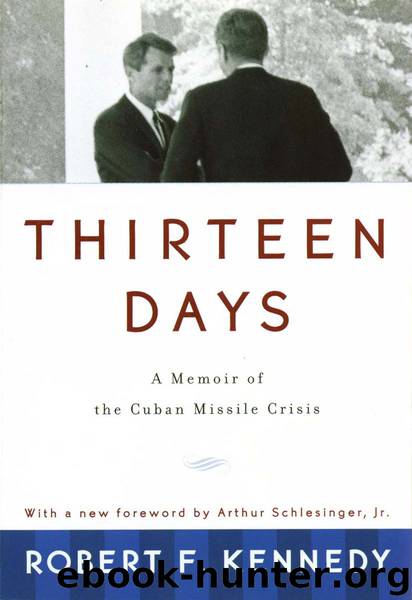Thirteen Days by Robert F. Kennedy

Author:Robert F. Kennedy
Language: eng
Format: epub
Publisher: W. W. Norton & Company
Published: 1969-12-04T16:00:00+00:00
NEW CHECKS AND BALANCES
In warmaking, the Constitution contemplated enforced collaboration between the President and his fellow politicians on Capitol Hill. In practice, as the missile crisis illustrates, a strong role for Congress is by no means assured. This does not mean, however, that Presidents act in isolation. Any modern President stands at the center of a watchful circle with whose members he cannot help but consult. Today, indeed, he is more dependent on Executive officials for advice as well as execution than our Constitution makers could have anticipated two centuries ago.
New checks and balances replace the old. There is, however, one extraordinary difference: the old circle was supposedly comprised of men who owed their places to elections, who themselves had experienced the risks of nomination and electioneering. Political accountability conferred on each, firsthand, legitimacy as an agent of the people. Indeed, our Constitution’s democratic element consisted mainly in reserving to these men the great decisions on the use of force. By contrast, the new circle is appointive or co-optive: congressmen may enter it and so may private citizens when their service as surrogates is wanted by a President. But mostly, and continuously, those assured an entry are the President’s own appointees: department heads, Chiefs of Staff, White House aides, and others whose institutional positions or personal relations make their presence virtual necessities for him. As this implies, they are by no means “mere” subordinates. He is no freer than he would have been with Congress to ignore them. But neither are they colleagues in the sense of sharing either his legitimacy or accountability. Nowadays those rest with him alone.
Consider again the group that made fundamental choices for the United States during the missile crisis. Who were the members?
First, there was the President as constitutional Commander in Chief, nationally elected. No other elective officer was so involved (save the Vice-President, an appropriately attentive listener). No member of the Senate or House stands astride the action channel for decisions on nuclear war. None is consulted unless the President so chooses as a matter of discretion. In October 1962, Congress remained ignorant of the Soviet missiles in Cuba during the first week of Ex Comm deliberations. Only on October 22, two hours before his broadcast to the world, did the President assemble the leaders of both houses, advise them of the missiles, and inform them that he had decided to respond with a naval quarantine. The Congressional leaders disagreed strongly with the course the President had chosen. Senator Fulbright in particular urged that the United States respond more forcefully. Senator Russell stated that “he could not live with himself if he did not say in the strongest possible terms how important it was that we act with greater strength.” The Senators insisted that the record show they had been informed, not consulted. But Congressional objections had no effect at that point. Nor was any member of Congress deeply involved in subsequent decisions during the week that followed.
Second, there were several men whose institutional
Download
This site does not store any files on its server. We only index and link to content provided by other sites. Please contact the content providers to delete copyright contents if any and email us, we'll remove relevant links or contents immediately.
| Biological & Chemical | Conventional |
| Nuclear |
The Radium Girls by Kate Moore(12028)
100 Deadly Skills by Clint Emerson(4925)
Rise and Kill First by Ronen Bergman(4789)
The Templars by Dan Jones(4689)
The Doomsday Machine by Daniel Ellsberg(4490)
The Rape of Nanking by Iris Chang(4213)
Killing England by Bill O'Reilly(4001)
Stalin by Stephen Kotkin(3965)
Hitler in Los Angeles by Steven J. Ross(3946)
12 Strong by Doug Stanton(3550)
Hitler's Monsters by Eric Kurlander(3343)
Blood and Sand by Alex Von Tunzelmann(3205)
The Code Book by Simon Singh(3189)
Darkest Hour by Anthony McCarten(3133)
The Art of War Visualized by Jessica Hagy(3007)
Hitler's Flying Saucers: A Guide to German Flying Discs of the Second World War by Stevens Henry(2754)
Babylon's Ark by Lawrence Anthony(2679)
The Second World Wars by Victor Davis Hanson(2524)
Tobruk by Peter Fitzsimons(2518)
